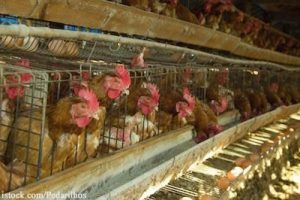Missouri is the latest state to consider passing a so-called “ag-gag” law that would criminalize the act of getting a job at an agriculture production facility expressly to gain access to make audio or visual recordings.
 Rep. Casey Guernsey, R-Bethany, is the sponsor of the bill which would make it: a Class B misdemeanor to use false pretenses to gain access to an agricultural production facility; a Class A misdemeanor to record images or sounds from such facilities and a Class D felony if there had been a previous violation.
Rep. Casey Guernsey, R-Bethany, is the sponsor of the bill which would make it: a Class B misdemeanor to use false pretenses to gain access to an agricultural production facility; a Class A misdemeanor to record images or sounds from such facilities and a Class D felony if there had been a previous violation.
These kinds of bills are gaining traction in some agricultural states after footage of animal cruelty captured by “undercover” animal rights activists created several high-profile stories.
Four years ago, the Humane Society captured footage of downer cattle being pushed with forklifts to slaughter for use in the National School Lunch Program. It led to the largest beef recall in U.S. history and the bankruptcy of the company. In Iowa, the first state to pass an ag-gag law, videos of deplorable conditions at egg production facilities prompted consumer recalls and rejections from big retailers including McDonald’s and Target.
“Cruelty to animals runs rampant on factory farms, and the industry knows it. Rather than improve the horrid conditions exposed by undercover investigations, agribusiness is attempting to silence whistleblowers who seek to expose and end animal abuse, food safety issues and other serious problems,” Matt Rice, Director of Investigations at Mercy for Animals, told Food Poisoning Bulletin.
Silencing whistle-blowers is not the intent of the bill, Rep. Guernsey told Food Poisoning Bulletin in a telephone interview today. “We wrote the bill very carefully to make sure whistleblowers are protected.” As it is written, the legislation targets those who are affiliated with activist groups, he said. “There are groups out there whose express intent is to put farmers out of business.”
Bad farmers who treat animals cruelly exist, but are not in the majority, said Guernsey, a farmer whose family has farmed for seven generations. Missouri’s biggest industry is agriculture and it’s well regulated by the state departments of agriculture and natural resources, he said. “If you don’t get good inspections, you can’t stay in business very long.”
In Missouri, the House votes on a bill three times before passing it on to the Senate. Today, in its second House vote, legislation advanced on a roll call vote, 124-29.




